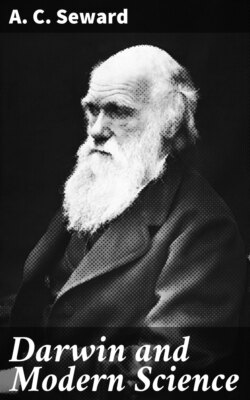Читать книгу Darwin and Modern Science - A. C. Seward - Страница 9
На сайте Литреса книга снята с продажи.
ОглавлениеHints of the idea of Natural Selection have been detected elsewhere. James Watt (See Prof. Patrick Geddes's article "Variation and Selection", "Encyclopaedia Britannica (9th edition) 1888.), for instance, has been reported as one of the anticipators (1851). But we need not prolong the inquiry further, since Darwin did not know of any anticipations until after he had published the immortal work of 1859, and since none of those who got hold of the idea made any use of it. What Darwin did was to follow the clue which Malthus gave him, to realise, first by genius and afterwards by patience, how the complex and subtle struggle for existence works out a natural selection of those organisms which vary in the direction of fitter adaptation to the conditions of their life. So much success attended his application of the Selection-formula that for a time he regarded Natural Selection as almost the sole factor in evolution, variations being pre-supposed; gradually, however, he came to recognise that there was some validity in the factors which had been emphasized by Lamarck and by Buffon, and in his well-known summing up in the sixth edition of the "Origin" he says of the transformation of species: "This has been effected chiefly through the natural selection of numerous successive, slight, favourable variations; aided in an important manner by the inherited effects of the use and disuse of parts; and in an unimportant manner, that is, in relation to adaptive structures, whether past or present, by the direct action of external conditions, and by variations which seem to us in our ignorance to arise spontaneously."
To sum up: the idea of organic evolution, older than Aristotle, slowly developed from the stage of suggestion to the stage of verification, and the first convincing verification was Darwin's; from being an a priori anticipation it has become an interpretation of nature, and Darwin is still the chief interpreter; from being a modal interpretation it has advanced to the rank of a causal theory, the most convincing part of which men will never cease to call Darwinism.
